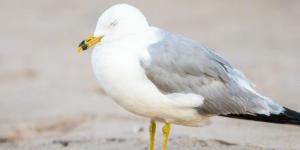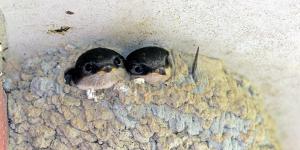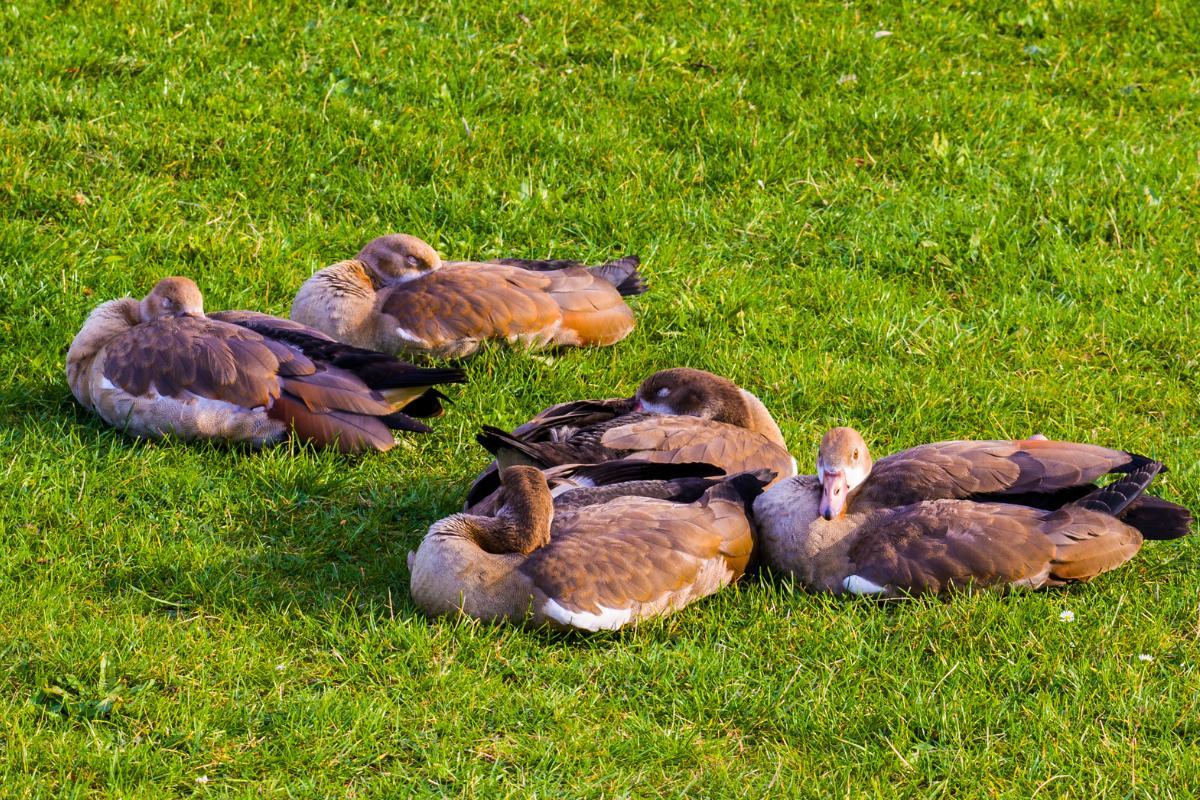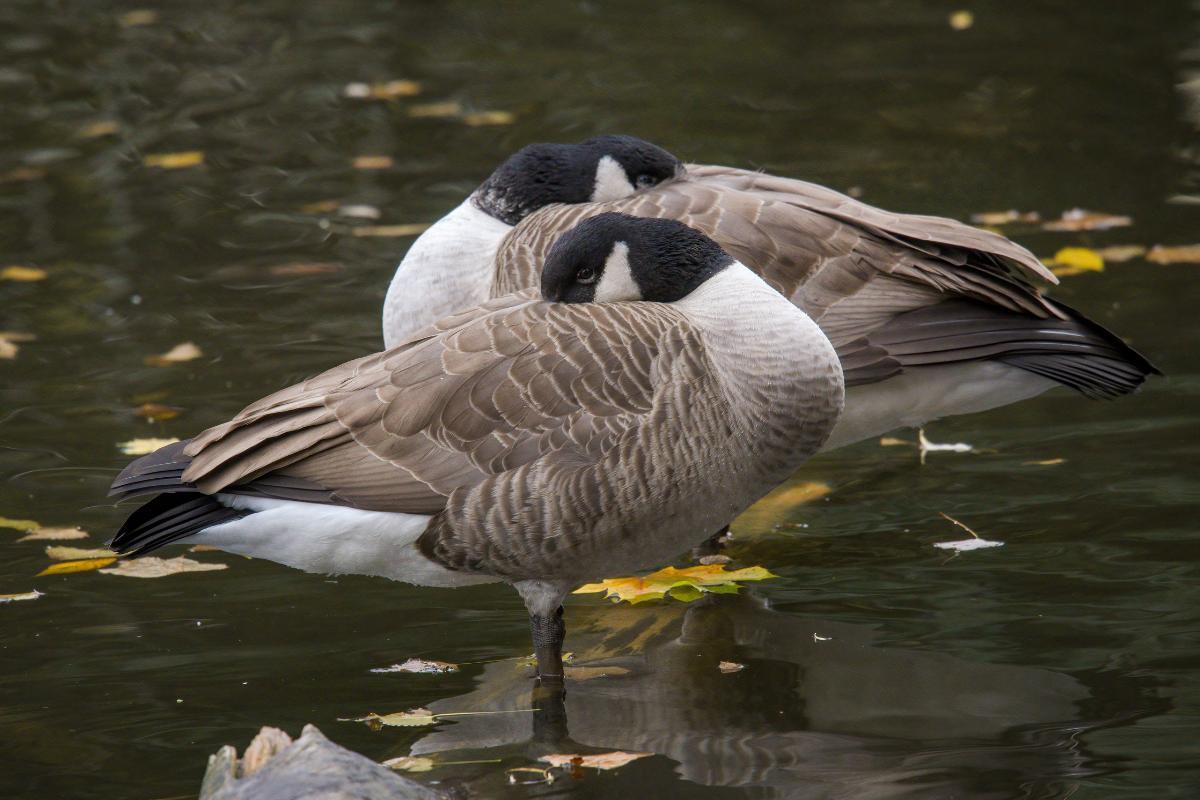Where Do Geese Sleep at Night?


Sleeping geese are not always a common sight in the wild. They are more noticeable when they are flying or padding around the side of a pond. This does not mean geese do not sleep. Belonging to the Anatidae family, geese are waterfowl that have long necks and webbed feet. While there are various different species of geese with their own specific behaviors, they all have certain behaviors in common in terms of sleeping habits.
At AnimalWised, we ask where do geese sleep at night? We answer this question by looking at sleeping patterns and behaviors of the goose, as well as provide any additional relevant information.
Where do wild geese sleep at night?
Geese are known for their migratory habits, flying in a characteristic V-formation when spotted from the ground. They can fly for extended periods, sometimes even over 24 hours. This doesn't give much time for sleep, but they will make up for it when they get a chance.
When they do eventually stop for a rest, they will need to find food and shelter before doing so. Being diurnal animals, they are most active during the daytime. Although they can rest or nap during the day, the period of longest sleep is usually during the night. For this reason, it is accurate to ask where geese sleep at night.
Wild geese will need to find the most appropriate place to sleep for their needs. For this reason, they will often prefer areas near bodies of water such as lakes, rivers or ponds. These places provide them with two main advantages:
- Protection against terrestrial predators
- Access to water for drinking and feeding
These areas also usually have dense vegetation, allowing them further protection from predators and the elements. Higher points are often favored, although they may also sleep on small islands in a body of water as the isolation can also benefit them. Wild geese live in flocks and will often designate one of their group to stand guard while the others sleep. This guard goose can then notify the others if trouble appears.
As geese move during their seasonal migrations, they adapt their resting places depending on food availability, weather conditions and other factors. Some regions are better adapted to for their rest needs, such as humid areas or wetlands. Settling in these areas means they can take advantage of natural resources and minimize risks.
Changes in the environment can be particularly aggravating to geese. Pollution, degradation of natural habitats and increased human activity can influence their resting patterns. As a result, it is crucial to conserve and protect key areas to ensure these birds can continue their migratory cycle and rest adequately.
The mystery behind where wild geese sleep reveals a series of adaptations and instinctive behaviors that reflect their ability to survive in diverse environments. Through studying and understanding their nocturnal habits, we can further appreciate the wonderful nature of these migratory birds and the importance of conserving their habitats.
Learn more about goose characteristics and behaviors with our article on whether geese have teeth.

Where do domestic geese sleep?
While wild geese are free to choose their nighttime shelters in the wild, domestic geese have different behavioral patterns and shelter requirements. This is because these birds are adapted to living in controlled environments under human care. Despite such controlled care, they still have need for a sense of protection and comfort when resting.
Most domestic geese are housed in enclosures or sheds specifically designed for this protection and comfort. These spaces are usually safe, protecting them from predators and adverse weather conditions.
Although domestic geese don't face the same threats as their wild counterparts, they still have protective instincts. It is essential that their bedding areas are closed and secure to avoid any potential dangers, including opportunistic animals.
Depending on the region and climate, additional measures may be required to keep geese comfortable year-round. In colder climates, heat sources can be provided. In warmer areas, adequate ventilation must be ensured. It is important to be considerate of the effects of non-natural environments on sleeping behaviors of geese. For example, prologned expose to artificial light can affect their sleeping patterns[1].
Being in a domestic environment, geese often form bonds with the humans who care for them. This can influence where they choose to rest, looking for areas close to homes or where they feel the presence and security that human contact provides them.
Over time, domestic geese develop specific routines and habits as to where they prefer to rest. Some may choose elevated areas within their enclosures, while others may opt for lower or sheltered areas.
How do geese sleep?
Now we know about where wild and domestic geese sleep at night, we can learn about the nature of how they sleep. The sleeping behavior of geese offers an interesting look into their biology and adaptations.
As with other birds, geese do not have continuous sleep patterns such as those common in many mammals. Instead, they often experience short cycles of intermittent sleep. While this occurs mostly at night, they will also do the same during the daytime. Such short sleep cycles allow them to stay alert to potential threats while still conserving their energy.
One of the most notable characteristics of geese is their tendency to sleep in groups. This group formation not only provides them with safety from predators, but also helps them conserve body heat, especially in cold climates. The act of sleeping in groups allows geese to be alert for any signs of danger, as some birds can stay awake while others rest.
An iconic image can be seen in geese standing on one leg while resting. This stance is not simply a quirk of nature. Keeping one foot raised helps conserve body heat by reducing heat loss through the extremities. Additionally, they may sometimes curl up and hide their head under their wings to stay warm and protected.
Geese are able to sleep both on land and on water. The latter usually occurs in short naps. This is because the capricious nature of water provides them with less protection. They will take short naps floating on top of the water, but will group together on land for longer sleeps.
While during the day they can feed, socialize and carry out other activities, at night they seek shelter to rest. It is at these times that their nocturnal behavior intensifies, especially in terms of forming protective groups.
Discover more about individual species behaviors by looking at our guide to the different types of geese.

Can geese sleep while flying?
It is thought by some that geese can sleep during flight, but this is not exactly true. They do not carry our true sleep when flying. Instead, they carry out something known as unihemispheric slow-wave sleep (USWS).
Unihemispheric slow-wave sleep (USWS) is a form of rest where the goose will shut down one hemisphere of their brain, allowing them to rest certain parts of their organism. The other parts of their organism engaged in flight will stay alert. This means they are not fully conscious, but they are not asleep either. When they enter USWS, the goose will close the eye corresponding to the brain hemisphere which has been shut down.
The reason for this ability is related to their migratory behaviors. As we have already stated, some geese can fly for a period of over 24 hours at a time during migration. This is because they may be flying over such a large body of water, it makes resting impractical. To carry out such sustained flight, they can rest parts of their body while in flight. Only when they land for a longer rest will the remain part of their brain become unconscious.
Now you know about where and how geese sleep at night, you may want to learn more about waterfowl with our comparison between a goose, as swan and a duck.
If you want to read similar articles to Where Do Geese Sleep at Night?, we recommend you visit our Facts about the animal kingdom category.
1. van Hasselt, S. J., Hut, R. A., Allocca, G., Vyssotski, A. L., Piersma, T., Rattenborg, N. C., & Meerlo, P. (2021). Cloud cover amplifies the sleep-suppressing effect of artificial light at night in geese. Environmental pollution (Barking, Essex : 1987), 273, 116444. Advance online publication. https://doi.org/10.1016/j.envpol.2021.116444
- Aulsebrook, A. E., Johnsson, R. D., & Lesku, J. A. (2021). Light, sleep and performance in diurnal birds. Clocks and Sleep, 3(1), 115-131.
- Kay, J. (2022). A new way of measuring sleep in geese.
- van Hasselt, S. J., et al (2021). Seasonal variation in sleep homeostasis in migratory geese: a rebound of NREM sleep following sleep deprivation in summer but not in winter. Sleep, 44(4), zsaa244.
- van Hasselt, S.J., Verhulst, S., Piersma, T., Rattenborg, N.C., & Meerlo, P. (2022). A comparison of continuous and intermittent EEG recordings in geese: how much data is needed to reliably estimate sleep-wake patterns? Journal of Sleep Research, 31(3), e13525.







